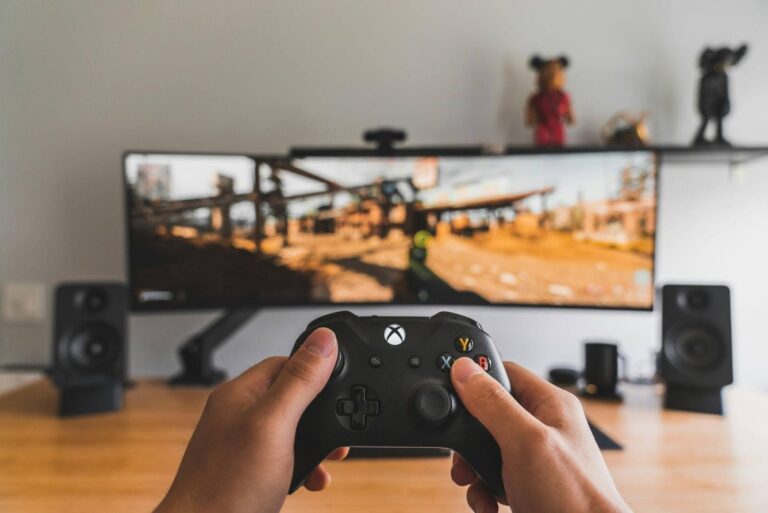The gaming industry is no longer a side hobby — it’s a global powerhouse. In fact, the global games market is projected to reach nearly US$190 billion in 2025, making it larger—or at least on par with—the combined revenue of the music and film industries in many analyses.
This growth is driven by more than just new titles or consoles. It’s about how players engage with games — and one of the biggest shifts is the rise of online gaming marketplaces. These marketplaces are doing more than just selling in-game items; they’re reshaping the way players experience, trade, and even profit from their favorite games.
By the end of this article, you’ll see how they’re opening up opportunities not just for casual gamers, but also for competitive players, collectors, and even small entrepreneurs looking to tap into the digital economy.
Why Game Marketplaces Are Changing the Player Experience
Marketplaces have turned gaming into something more dynamic and customizable. Instead of being locked into what developers release each season, players can choose exactly what they want, when they want it.
This flexibility benefits everyone:
- Casual players can skip repetitive grind sessions and jump straight to the fun.
- Competitive players can stay current with the meta by quickly acquiring high-demand gear.
- Collectors can complete rare sets or unlock skins that would have been otherwise unobtainable.
This level of control keeps players engaged longer and allows them to make their gaming experience truly their own — something that wasn’t as easy just a few years ago.
Why Platform Choice Shapes Your Digital Trading Experience
The in-game economy is bigger than ever, and with billions of players trading items daily, safety has become the top priority. A single bad transaction can ruin the entire experience, so players look for platforms that feel as reliable as the games they love. That means secure payment gateways, fair pricing, and instant delivery aren’t optional — they’re what separate a good marketplace from a risky one.
Trust is what keeps this system running. Marketplaces that:
- Clearly show seller ratings
- Offer buyer protections,
- Resolve disputes quickly
These qualities give players the confidence to return again and again. That trust doesn’t just protect individuals, it strengthens the entire gaming community by making participation feel safer and easier.
Industry voices highlight this shift too. “Players feel more confident when platforms focus on safety and speed. That confidence turns into higher engagement, longer play, and a healthier player community,” says Anna Zhang, Head of Marketing at U7BUY. She notes that features like verified sellers, clear refund policies, and fast delivery aren’t just conveniences — they’re what make players comfortable enough to keep exploring and investing in the digital economy.
When the process feels seamless, players are more willing to try new titles, purchase rare items, and stay active in the ecosystem — all of which keep the marketplace thriving.

Opportunities for Sellers and Small Entrepreneurs
Marketplaces aren’t just changing the game for buyers — they’re giving sellers real opportunities, too. What started as a casual way to trade extra items has become a viable income stream for many players.
- Side hustles: Selling extra in-game resources or leveled accounts for extra cash.
- Micro-businesses: Building regular customers and scaling up into a consistent monthly income.
- Flexibility: Working from anywhere, setting your own hours, and controlling inventory.
For some, what began as a fun weekend activity is now a sustainable online business.
How Developers Are Responding
Developers have noticed the growing demand for trading and are starting to integrate it into their games. Some create official marketplaces, while others add features like peer-to-peer trading systems.
This benefits both sides: developers keep players engaged longer, and players get a more connected, community-driven experience. In some cases, developers even use data from third-party trading to see which items are popular and design future updates accordingly.
Key Risks Players Should Watch Out For
Even with better protections, players should stay cautious. A few things to keep in mind:
- Avoid sharing account credentials or personal data.
- Check seller ratings and reviews before making a purchase.
- Be aware of price spikes during seasonal events or limited drops.
Using verified platforms and enabling two-factor authentication can reduce most risks and keep the process stress-free.
The Future of Game Marketplaces
The next wave of digital economies may include blockchain-based ownership, cross-game trading, and even resale markets for rare digital collectibles. This means the items you earn or buy could hold value long after you’ve moved on to a new game.
Players are moving toward true digital ownership — and marketplaces will likely become even more important as the industry heads in that direction.
Final Thoughts
Gaming marketplaces aren’t just about buying items anymore — they’re creating entirely new ways to play, trade, and earn. They give players more control, open doors for entrepreneurial gamers, and keep the entire community engaged for longer.
The key is choosing platforms that are secure, transparent, and easy to use — which is exactly why trusted names in the space are becoming go-to resources for players everywhere.






